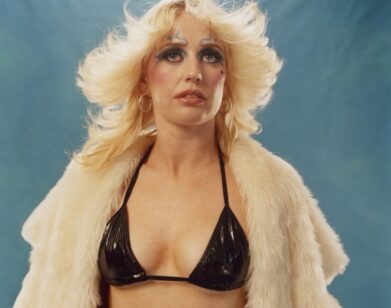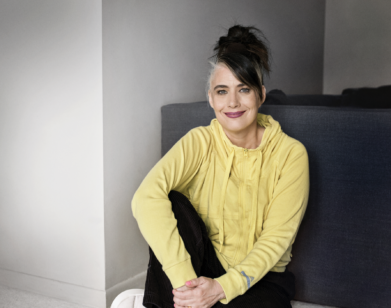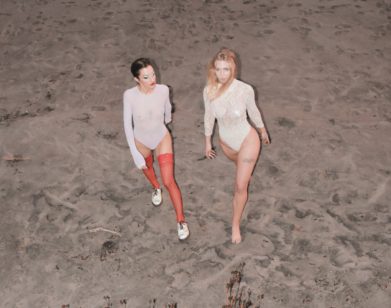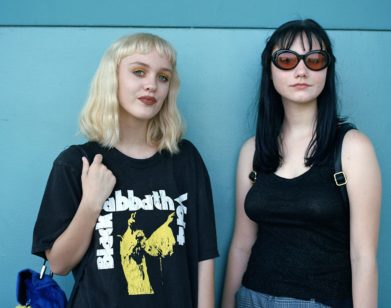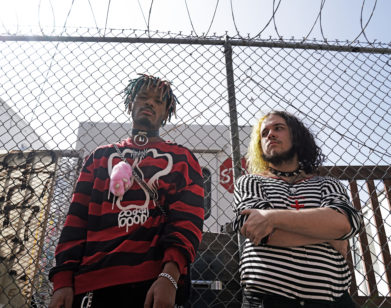London punks Dream Wife: Women can be angry, women can scream
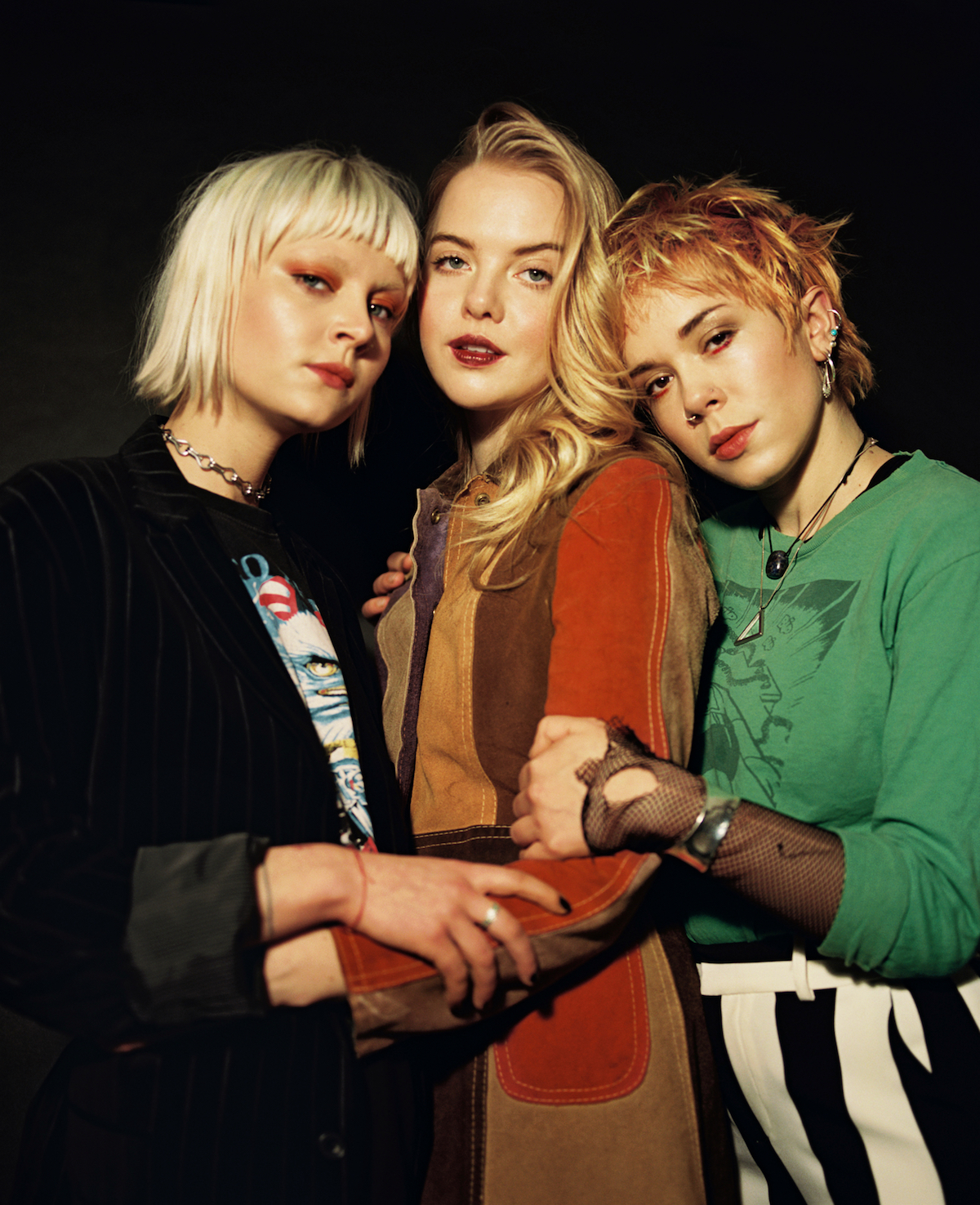
When it comes to labels, Rakel Mjöll, Alice Go and Bella Podpadec rebuke the terms “riot grrrl” or “girl band.” Instead, the London-based punks will just stick with Dream Wife—a name cooked up to subvert the image of a ’50s housewife that is part of some trite chauvinist ideal. Started while the trio were studying visual arts at Brighton University, the band mixes heavy riffs with a pop sensibility, delivering fuzzy feminist anthems that are equal parts catchy and lo-fi that call to mind peers like Deap Vally or Cherry Glazerr.
With their self-titled debut album out January 26, the girls are focused on speaking their mind and smashing stereotypes. Through crushing riffs and high-octane lyrics, they tackle everything from breaking barriers to broken hearts. “Women can be angry, women can scream,” explains Go, when asked about what it means to be in a women-only band. “Our record is just about owning that.”
“We’re three women in our twenties,” adds Mjöll, “flipping the script and not apologizing.” Ahead of their debut release, the band sat down to talk with us about channeling Blondie and calling out “bad bitches.”
ALEXANDRA WEISS: What was the impetus for starting Dream Wife? I know you’ve all been in other bands previously, so what inspired you three to get together?
MJÖLL: It was quite random, actually. Bella and I were living together at the time and on a night out, and we got this idea that we really wanted to go to Canada. So we were like, “How do we get to Canada? What if we form a band and go on tour there?” Then we called Alice the next day to see if she wanted to join.
WEISS: So you basically started a band because you wanted to go to Canada?
MJÖLL: Yeah, basically. We wrote four songs and went on tour there. But we had so much fun, that when we got back, we decided to write four more songs. And it just continued from there.
WEISS: Your new album comes out this week. How would you describe it?
GO: It was really important for us to try and get the live sound down. Playing live is what it’s all about. Going into the studio, the goal was really to try and capture what we do onstage. The record has a real raw energy to it, and a pop sensibility too. But ultimately, it’s got our punk attitude all over it.
WEISS: How does this compare to your previous EP?
GO: When we wrote the EP, it was more about just doing it and getting our music out there. Since then, we’ve really solidified our sound.
MJÖLL: And it was great to be able to step it up sonically but still hold onto the raw element we have in our performances. There’s just this magical interaction when you’re playing to a crowd. Trying to capture that and put it on a record can be difficult, but we really wanted to keep that energy.
PODPADEC: We’ve also been playing together for two or three years now. In the beginning, we’d write a song in our windowless room in south London, then try it out onstage the next day. It’s a great way to find out if things are working—to try it out on a live audience. But doing that for so many years now, we’ve finally figured out exactly what we want to say.
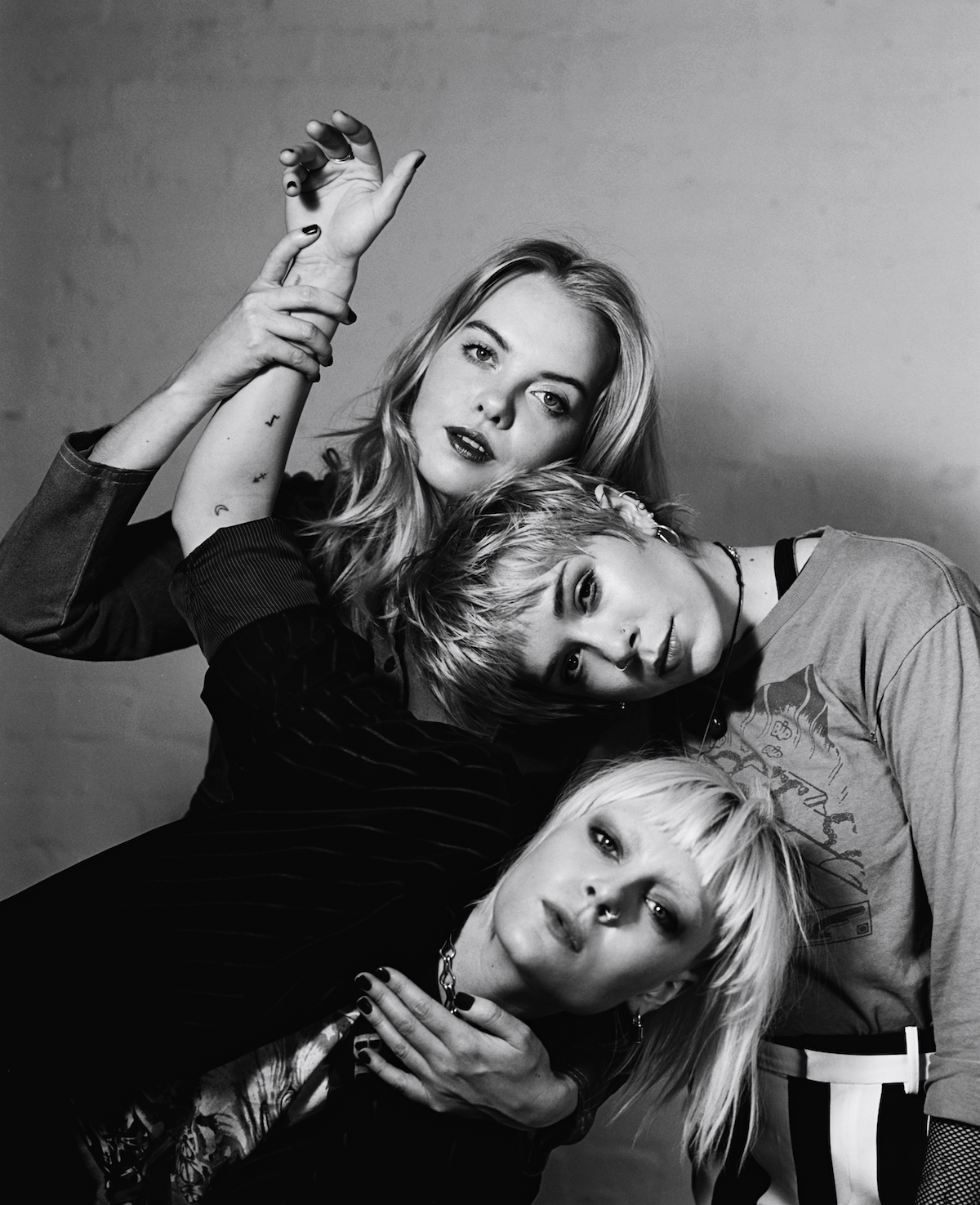
WEISS: What’s that message?
GO: The idea behind Dream Wife from the start was just us as three friends, getting together and doing it, smashing all expectations as women.
MJÖLL: It’s about empowering yourself and your group, and it’s such a fun thing to be able to do this with two great friends. The album is completely unapologetic, and it shows the many faces of womanhood, because that’s what we know.
WEISS: Does the record touch on your experiences as women in the industry? I feel like girls are either labeled as pop stars or Riot grrrls—there’s nothing in between.
MJÖLL: All of these labels are just ways to stereotype women and it’s lazy journalism. People will always say things, whether they’re true or not, and you just have to rise above it and continue to do what you’re doing. At the end of the day, all you can do is change people’s minds, and hopefully, the record is opening people up to all of the things a woman can be.
PODPADEC: We didn’t go into this album thinking, “Okay, we’re going to write about this and womanhood and that”—we just wrote about our experiences and what we were feeling. It’s not until you look back and realize, “Oh, ‘Somebody’ is about sexual assault and ‘Kids’ is about nostalgia.” It’s really not until you distance yourself from your work that you understand it.
MJÖLL: Right, and songwriting is subconscious—whatever is filtering through the back of your mind comes out in the track, and sometimes, you don’t realize it until someone else points it out. Same with our influences. We realized when we were mixing the record that a lot of the references we had unconsciously channeled were all of these amazing women, like Karen O and Blondie. Because you write about things like sexual assault and misogyny, you’re regularly referred to as a feminist rock band. Does that ever feel limiting?
PODPADEC: It’s almost like we’re the unicorn in the room. You would never ask our male peers how they feel about being a boy in a band. You’d also never call them a “boy band.” But somehow, both of those things are okay because we have vaginas. I mean, girl bands are an amazing part of pop history, but we don’t sound like the Spice Girls. So, why are being labeled something we don’t even sound like?
GO: And it’s not like we’re not feminists. Of course we are. But when it becomes a thing where they put you on a pedestal, it actually isolates the issue and alienates the conversation from being something everyone can engage in. To pigeonhole a band because of their gender, their sexuality, their political stance, whatever—it’s a much larger issue. We’re very careful about never defining ourselves just by the fact that we’re women.
PODPADEC: When it comes down to it, just listen to the music. See if you like it or not. Does it make you want to dance, be angry and scream in your car? Whatever emotion you feel, that’s the dream, that’s what it should be about.
WEISS: What about the name Dream Wife—where did it come from?
MJÖLL: It’s really about criticizing this ’50s idea of the dream house, dream car, dream wife—that she’s just part of the package, another thing. It’s so important for us to show how complex women can be, and the sort of ’50s Dream Wife concept is the opposite of that. For us, being a woman means being unashamed of being angry or emotional or sexy; it means embracing yourself, your friends and the powerful women around you. That’s really what we wanted to express with the name, and this album—allowing yourself to be sensitive and sensual and whatever else you want to bring to the table.

WEISS: You mentioned Blondie and Karen O as two of the influences for this record, what are some of the artists you were channeling?
PODPADEC: Joan Jett, absolutely. The way she’s so aggressive with a guitar—she’s an icon.
MJÖLL: Bowie is also a big influence for us—his music, and the way he totally changed gender norms.
GO: Same with Madonna. She’s been revolutionary when it comes to exploring different representations of what it means to be a woman. She’s an absolute icon, as well.
WEISS: The album is coming out at a really interesting time, considering the current political climate. What do you see as your role as artists, and specifically as women?
GO: Right now, and with #MeToo, it feels like a conversation is finally starting to happen. We played “Somebody” on a recent tour in the U.K. and it became this poignant moment where people were sharing things with each other and there was a sense of solidarity and engagement. So, being a band with that kind of message, it’s a really exciting time. We felt like we had to put out a record to join the conversation.
MJÖLL: Also, what we’ve been exploring on our recent tours, is that the crowds are getting even bigger. In the U.K., especially, and we’ve noticed a lot more girls are coming to the shows. So what we’ve been thinking a lot about, is making sure to create a space at our gigs. It’s so important to be able to feel like you can fully engage and lose yourself at a rock show, while still feeling safe as a young girl. That’s something we really want to emphasize. We even have a part in our set where we’ve been calling forth bad bitches, and it’s been really fun. Asking all of these amazing women who are at our shows to come to the front and take their space—that’s been so cool and empowering.
PODPADEC: It’s not often that men are told to move away and make room for girls. So it’s pretty incredible to see all of these women of different ages who don’t know each other come to the front and start a mosh pit. It’s like this giant gang of bad bitches.
GO: It also speaks to why we started Dream Wife. Growing up, we all went to rock shows and had this overwhelming sense of vulnerability as girls that made use feel like outsiders—that these spaces were not for us. Punk rock and rock have always been such boy’s clubs. So it’s been really important for us to make our shows not just safe for women, but normal and welcome. It feels like our duty to encourage that and question why it hasn’t been.
WEISS: That idea is really reminiscent of the whole Riot grrrl “Girls to the Front” mantra from the ’90s. Was that your inspiration?
MJÖLL: It really just happened organically because we were noticing that girls weren’t as eager to come to the front and we just wanted to prove that shows are a shared space. But it’s also about acknowledging, “I see you in the back, I see you with the pink hair, I see you with that awesome red cap. I want you all to come to the front and join me and sing this bad bitches anthem.” It also destroys the separation between the band and the audience. I would never want to miss being in a mosh pit with all these amazing women.
WEISS: What do you want people to take away from the record?
MJÖLL: I want them to strut down the street and feel empowered.
PODPADEC: When I heard the Strokes album for the first time, I remember being a kid walking down the street jumping and punching everything, and all the adrenaline that came through just listening to the album on my iPod. That’s what I want people to feel like.
DREAM WIFE’S SELF-TITLED DEBUT RECORD WILL BE AVAILABLE JANUARY 26, 2018.

